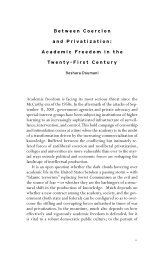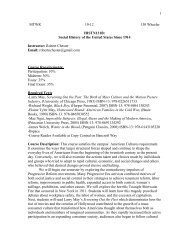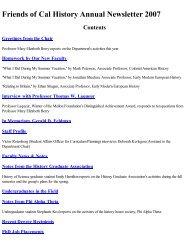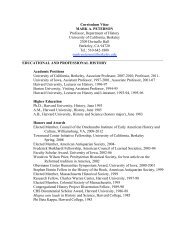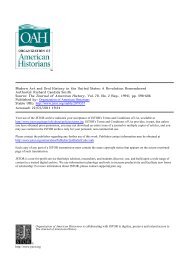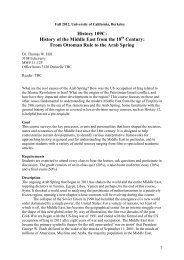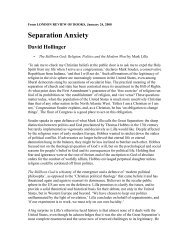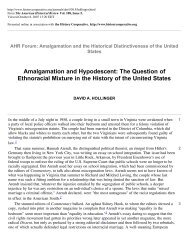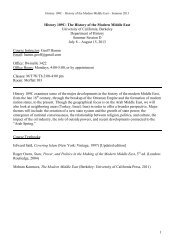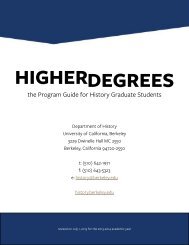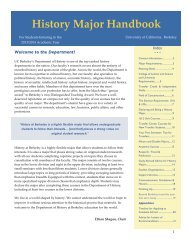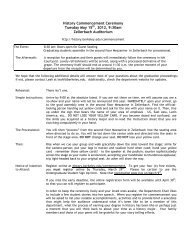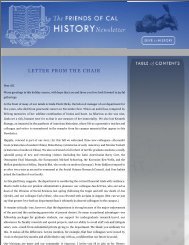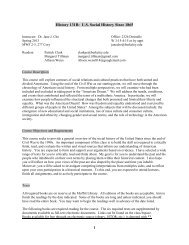My Grandmother and Other Stories: Histories of the Palestinians as ...
My Grandmother and Other Stories: Histories of the Palestinians as ...
My Grandmother and Other Stories: Histories of the Palestinians as ...
You also want an ePaper? Increase the reach of your titles
YUMPU automatically turns print PDFs into web optimized ePapers that Google loves.
to more democratic <strong>and</strong> inclusive participation <strong>of</strong> <strong>Palestinians</strong> in <strong>the</strong> socioeconomic<br />
<strong>and</strong> cultural processes that shape <strong>the</strong>ir lives.<br />
By way <strong>of</strong> making a small contribution to this larger goal, <strong>the</strong> Institute <strong>of</strong> Jerusalem<br />
Studies provided <strong>the</strong> institutional platform for a series <strong>of</strong> workshops I led in <strong>the</strong><br />
occupied Palestinian territories in July <strong>and</strong> August, 2007 on <strong>the</strong> <strong>the</strong>me “Silenced<br />
<strong>Histories</strong>: Towards an Agenda <strong>of</strong> Research on <strong>the</strong> Social <strong>and</strong> Cultural History <strong>of</strong> <strong>the</strong><br />
<strong>Palestinians</strong>.” The Institute hosted <strong>the</strong> first two workshops <strong>and</strong> helped organize <strong>the</strong><br />
o<strong>the</strong>rs. 2 The essays in this volume are a partial product <strong>of</strong> this combined effort.<br />
The workshops, <strong>as</strong> originally envisioned, had three specific goals. One w<strong>as</strong> to take<br />
stock <strong>of</strong> <strong>the</strong> many studies on Palestinian social <strong>and</strong> cultural life published over <strong>the</strong><br />
p<strong>as</strong>t two decades. What explains <strong>the</strong> new trends in scholarly output? What places,<br />
periods, <strong>and</strong> social groups do <strong>the</strong>y privilege or ignore? What new sources are <strong>the</strong>y<br />
drawing on <strong>and</strong> in what ways? Have <strong>the</strong>y made a difference in how we divide <strong>the</strong><br />
p<strong>as</strong>t into discrete periods or in how we conceive <strong>of</strong> <strong>the</strong> dynamics <strong>of</strong> change? Do<br />
<strong>the</strong>se new social <strong>and</strong> cultural histories set <strong>the</strong>mselves apart from <strong>the</strong> dominant<br />
political narratives or do <strong>the</strong>y argue for a new underst<strong>and</strong>ing <strong>of</strong> what constitutes<br />
<strong>the</strong> political? In what ways are Palestinian scholars trying to take ownership <strong>of</strong><br />
Palestinian history? And in what directions do <strong>the</strong>y want to push agend<strong>as</strong> for future<br />
research?<br />
In order to bring <strong>the</strong>se issues into greater focus, I <strong>as</strong>ked each participant to prepare<br />
for <strong>the</strong> workshops by writing an essay on <strong>the</strong> life <strong>of</strong> her or his gr<strong>and</strong>mo<strong>the</strong>r or<br />
gr<strong>and</strong>fa<strong>the</strong>r. 3 The idea behind this second goal w<strong>as</strong> to expose a set <strong>of</strong> relationships<br />
normally hidden in <strong>the</strong> shadows <strong>of</strong> political history, <strong>and</strong> to reflect on how <strong>the</strong>se<br />
relationships can lead us to re-imagine <strong>the</strong> histories <strong>of</strong> <strong>the</strong> <strong>Palestinians</strong>. Taking<br />
advantage <strong>of</strong> <strong>the</strong> fact that most <strong>of</strong> <strong>the</strong> participants are <strong>of</strong> middle-age, <strong>the</strong> third goal is<br />
to shed light on <strong>the</strong> most important <strong>and</strong>, until now, greatly under-studied rupture in<br />
Palestinian life prior to 1948: <strong>the</strong> enormously destructive <strong>and</strong> transformative impact <strong>of</strong><br />
World War I on Palestinian society, economy, culture, <strong>and</strong> identity.<br />
In writing <strong>the</strong> social biography <strong>of</strong> his or her gr<strong>and</strong>mo<strong>the</strong>r, each participant w<strong>as</strong> <strong>as</strong>ked<br />
to consider what is at stake on <strong>the</strong> political <strong>and</strong> methodological levels, in addition<br />
to <strong>the</strong> meta-historical ones alluded to by <strong>the</strong> questions above. On <strong>the</strong> political level,<br />
what are <strong>the</strong> implications <strong>of</strong> delving into <strong>the</strong> rich diversity, internal contradictions <strong>and</strong><br />
conflicting trajectories <strong>of</strong> Palestinian life? Is <strong>the</strong>re a danger that <strong>the</strong> messiness <strong>of</strong> <strong>the</strong><br />
p<strong>as</strong>t will make impossible a politically useful historical narrative at a time when <strong>the</strong><br />
<strong>Palestinians</strong> need such a narrative more than ever? For example, what do <strong>the</strong> terms<br />
“indigenous” <strong>and</strong> “people” mean in <strong>the</strong> context <strong>of</strong> <strong>the</strong> v<strong>as</strong>t multi-ethnic Ottoman<br />
Empire that ruled this region for four centuries (1516-1917), or in <strong>the</strong> context <strong>of</strong><br />
<strong>the</strong> borders <strong>of</strong> <strong>the</strong> British M<strong>and</strong>ate (1922-1948) that were imposed by imperial fiat?<br />
[ 4 ] EDITORIAL <strong>My</strong> <strong>Gr<strong>and</strong>mo<strong>the</strong>r</strong> <strong>and</strong> <strong>O<strong>the</strong>r</strong> <strong>Stories</strong>



